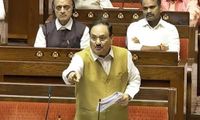The Lok Sabha early Thursday passed the contentious Waqf (Amendment) Bill, 2025, after over a 12-hour debate, which saw the ruling NDA strongly defending the legislation as beneficial for minorities, while the opposition described it as "anti-Muslim." The Bill was passed with 288 votes in favor and 232 against after all opposition amendments were rejected by voice votes.
In his reply to the debate, Union Minorities Affairs Minister Kiren Rijiju stated that there is no place in the world safer than India for minorities. He emphasized that minorities, including the small Parsi community, are safe in India and live with pride. "Some members have said that minorities are not safe in India. This statement is completely false. There is no place safer than India for minorities. I am also a minority and we all are living here without any fear and with pride," he stated.
Rijiju cited the examples of the Dalai Lama and the Tibetan community, along with minorities from Pakistan, Bangladesh, Afghanistan, Myanmar, and Sri Lanka, who have sought refuge in India due to persecution. "How can you say that minorities are not safe in India? Very, very wrong to say this," he asserted. He further indicated that the Bill aims to unify all minorities in the country and highlighted the support from the Christian community for the legislation.
According to Rijiju, the government intends to expedite the resolution of disputes pending with Waqf tribunals, stating, "Justice delayed is justice denied. Widows, divorcees, and orphans will be given justice through the Bill."
Union Home Minister Amit Shah also defended the Bill, asserting that the government operates on principles of justice and welfare rather than vote banks. He claimed that intimidation of minorities and misinformation surrounding the Waqf Bill were aimed at creating a vote bank. "Everyone has the right to follow their religion, but conversion cannot be done for greed, temptation, and fear," he said, stressing that the Modi government is committed to ensuring no citizen is harmed, regardless of their religion.
Shah criticized the previous 2013 Wakf Act amendment, alleging that it was enacted for political gain just before elections, which resulted in the transfer of 123 properties in Delhi's Lutyen's Zone to the Waqf just 25 days before the 2014 elections. He emphasized that without the amendment to the Wakf Act in 2013, there would have been no need for the current legislation.
Opposition members voiced strong objections to the Bill. Congress MP Gaurav Gogoi stated that the INDIA bloc will oppose the proposed changes, calling the Bill an attack on the Constitution. He accused the government of misleading Parliament and claimed the Bill aims to dilute the Constitution, defame minority communities, divide Indian society, and disenfranchise minorities.
Samajwadi Party chief Akhilesh Yadav described the Bill as a BJP strategy for polarization following its setbacks in the 2024 Lok Sabha polls. He warned that the legislation would send a detrimental message about India's secular image. "This Bill will prove to be a Waterloo for the BJP as some of its allies might be claiming to support the legislation but inside they are not happy about it," he remarked.
AIMIM chief Asaduddin Owaisi staged a symbolic protest by tearing up a copy of the Bill during the debate. Rahul Gandhi, the Leader of Opposition in Lok Sabha, labeled the Waqf Bill a weapon aimed at marginalizing Muslims and usurping their personal laws and property rights. He stated, "This attack on the Constitution by the RSS, BJP, and their allies is aimed at Muslims today but sets a precedent to target other communities in the future."
The Waqf (Amendment) Bill aims to strengthen Waqf tribunals, maintain a structured selection process, and fix tenure for efficient dispute resolution. It proposes reducing Waqf institutions' mandatory contribution to Waqf boards from 7 percent to 5 percent and requires audits by state-sponsored auditors for institutions earning over Rs 1 lakh.
Additionally, the Bill proposes a centralized portal to automate Waqf property management, enhancing efficiency and transparency. Practicing Muslims who have been practicing for at least five years can dedicate their property to the Waqf, restoring pre-2013 rules. The legislation stipulates that women must receive their inheritance before the Waqf declaration, with special provisions for widows, divorced women, and orphans.
Moreover, an officer above the rank of collector will investigate government properties claimed as Waqf, and non-Muslim members will be included in the central and state Waqf boards to promote inclusivity. J.P. Nadda noted that over the decades, 5,970 government properties, including lakes, have been declared as Waqf assets.
As the debate on the Waqf (Amendment) Bill, 2025, concludes, the implications of this legislation remain a point of contention, reflecting broader societal debates about minority rights and the role of religion in governance. The passage of the Bill marks a significant moment in India's legislative landscape, one that will likely resonate in political discussions for years to come.





